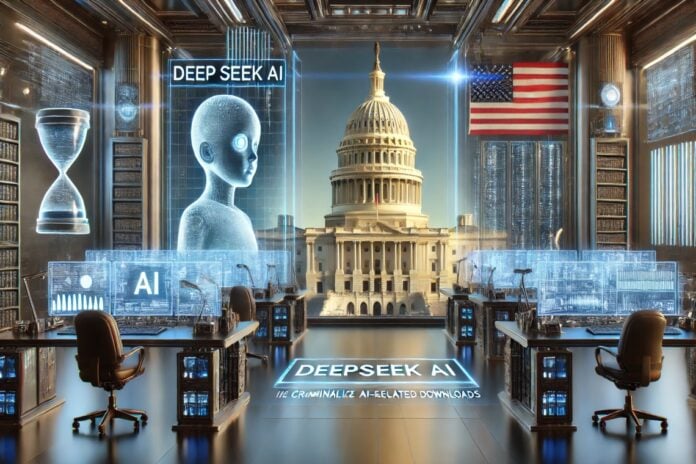DeepSeek AI, an advanced artificial intelligence model developed in China, is now the subject of a proposed law in the United States (USA).
Senator Josh Hawley has introduced a bill that could criminalize the download and use of DeepSeek AI within the country. This initiative raises questions about national security, technological competition, and AI regulation.
Summary
DeepSeek AI and the concern of the USA government
DeepSeek AI is a sophisticated artificial intelligence model developed in China, designed to process and generate content with a high level of precision. However, its origin has raised concerns in the US government.
The bill introduced by Senator Josh Hawley aims to prevent the software from being downloaded or used in the United States, citing national security risks related to its possible integration into the country’s computer systems.
According to Hawley, the use of artificial intelligence developed in China could expose sensitive data and critical infrastructure to the interests of the Chinese government.
This position fits into a broader context of tensions between the United States and China in the technology sector, already evident in the bans imposed on companies like Huawei and TikTok.
If approved, the law proposed by Hawley could make it illegal to download and use DeepSeek AI in the United States. This raises several questions:
- – Applicability and control: preventing the download of software distributed on the internet is complex and requires advanced surveillance measures.
- – Impact for developers and companies: companies and researchers using AI models might find themselves limited in their technological choices.
- – Diplomatic consequences: such a move could exacerbate relations between Washington and Beijing, already tense on multiple technological and commercial fronts.
The potential criminalization of the use of DeepSeek AI could also create precedents for the regulation of other technologies developed in countries considered geopolitical adversaries by the United States.
Precedents and comparison with other technological restrictions
It is not the first time that the United States has imposed restrictions on technologies developed abroad. TikTok, Huawei, and other Chinese giants have faced limitations for reasons of national security.
However, banning the download of artificial intelligence software represents a more radical measure compared to those adopted in the past.
The American government has already placed several Chinese companies on the blacklist of the Department of Commerce, preventing U.S. businesses from collaborating with them.
If DeepSeek AI were considered a security threat, it could face similar restrictions. However, it remains to be understood how risky its use actually is and whether there is concrete evidence of possible vulnerabilities or improper uses.
While Hawley and other legislators support the need to protect the United States from potential cyber threats, some technology and digital freedom experts raise doubts about the measure.
- – Limitations on research and innovation: banning access to DeepSeek AI could penalize researchers and developers who want to study or engage with advanced artificial intelligence models.
- – Difficoltà di applicazione: blocking the download of software available online is technically complex and could push users to seek alternative ways to access it.
- – Issues of digital freedom: some critics see in this proposal a dangerous precedent, which could justify future restrictions on technologies developed in other countries.
Possible future developments
The bill proposal still needs to be discussed and approved by Congress. The debate on DeepSeek AI is part of a broader context of artificial intelligence regulation and technological competition between the United States and China.
If the law were to be approved, it could have significant repercussions on the artificial intelligence sector, limiting access to tools developed abroad and encouraging the creation of alternative models within the national context.
However, it remains to be seen if this measure will actually be applied and in what ways.
The bill against DeepSeek AI represents a new chapter in the technological confrontation between the United States and China.
If approved, it could redesign the dynamics of access and use of artificial intelligence in the United States, with possible consequences on innovation, security, and digital freedom.
The debate remains open, and it will be crucial to observe how the situation evolves in the coming months.

